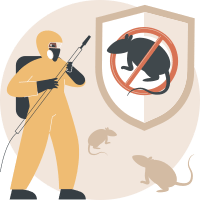Signs of a Mice Infestation
Droppings
Mice can produce 50-75 droppings daily, often found in kitchen areas, cupboards, and storage spaces.
Urine Trails
Being incontinent, mice spread urine along surfaces they walk on, contaminating areas and spreading germs.
Scratching Sounds
Mice often travel through wall cavities and loft spaces, creating scratching noises as they search for food and nesting spots.
Foul Odor
Dead or decomposing mice in wall cavities or under floorboards can cause a strong, unpleasant odor.
Burrowing
Mice may burrow in insulation or soil, creating nesting sites and furthering their access points.
Why Choose Professional Mice Control Services?
Mice breed rapidly, with a single female mouse capable of producing 5-10 litters annually. They reproduce at just 10 weeks old, making it crucial to eliminate the entire colony for effective control. Our pest control technicians are experts in mouse behavior and use the latest, most effective baits placed strategically for optimal results.
In addition to rapid breeding, mice pose serious health risks, spreading diseases like hantavirus, salmonella, and listeria through their droppings and urine. They also cause extensive property damage by chewing through electrical cables and pipes, increasing fire and flood risks.
Preparation Before Mice Treatment
Leave Droppings for Inspection
Allow our technician to see any visible droppings or damage.
Record Sightings
Note where you observe mice or signs of activity.
Communicate with Neighbors
Check if neighbors have noticed mice, as infestations often affect multiple homes.
Avoid Feeding Birds and Composting Food
Outdoor food sources attract mice, so refrain from bird feeding and composting food items.
Clear Food Debris
Remove crumbs from kitchen cabinets and under appliances.
Store Food Securely
Remove exposed food, including pet food, and store it in mouse-proof containers.
Aftercare Tips for Preventing Future Infestations
Avoid Bird Feeding and Composting Food
Food sources should be minimized outdoors.
Secure Animal Food and Rubbish
Store pet food in sealed containers and keep rubbish bins closed.
Mouse-Proof Animal Hutches
Ensure outdoor pet enclosures are secure against rodents.
Seal Access Points
Block any holes around pipes, air bricks, or other potential entryways.
Monitor Compost and Vegetation
Keep compost heaps and garden areas tidy to discourage nesting.
How Our Mice Control Treatment Works?
We use advanced baits and poisons placed in targeted locations to effectively eliminate mice.
Baits are contained in feeding boxes or trays to prevent accidental contact by pets and children. It can take several days to see the effects as the entire colony is exposed.
- On the initial visit, the technician will inspect the premises to identify rodent activity and treat potential entry points using appropriate rodenticides and baits. The baits are laid inside secured bait boxes that are child—and pet-proof. Please note that if mice die in inaccessible areas, such as under floorboards, there may be temporary odours.
- On our second visit, we remove baits and any deceased mice for safe disposal, following safety protocols to reduce health risks.
By choosing our professional mouse control services, you’re investing in a safer, pest-free home. Our comprehensive treatment plan, paired with effective aftercare tips, ensures the best results for long-term prevention.

